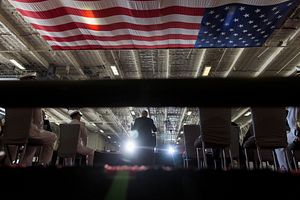Trans-Pacific View author Mercy Kuo regularly engages subject-matter experts, policy practitioners, and strategic thinkers across the globe for their diverse insights into the U.S. Asia policy. This conversation with Jamie Fly – Senior Fellow and Director of the Future of Geopolitics and Asia programs at the German Marshall Fund of the United States and former foreign policy adviser to U.S. Senator Marco Rubio, with previous senior-level U.S. government service at the National Security Council and Office of the Secretary of Defense – is the 112th in “The Trans-Pacific View Insight Series.”
What conventional assumptions about the future of geopolitics are being challenged?
There are domestic and global trends reshaping geopolitics. In liberal democracies, populist forces are increasingly raising questions about the merits of international engagement. Geopolitics in the 21st century will be shaped by how the United States responds to rising and resurgent powers attempting to undermine American influence. This all comes as we are on the cusp of technological developments that have the potential to reshape the way that people live and work. These advances represent the potential for great progress for billions, but also will possibly open up the world’s population to exploitation and manipulation.
Describe three scenarios – good, bad and ugly – for the future of geopolitics.
Human progress means that there are significant opportunities for humanity in the 21st century. Billions will be lifted out of poverty. Technology will continue to change people’s lives for the better. Yet there are disturbing trends that run counter to this advancement. In the so-called “West,” publics are increasingly skeptical of the benefits of globalization and often fearful for the security of their families and their economic well-being. Authoritarians around the globe are increasingly emboldened, so much so that some have turned their attention toward undermining the pillars of democracy in Europe and the United States. How the free world responds to these challenges will define whether the 21st century world makes progress from the 20th. With increasing conflict in many regions, continued nuclear proliferation, and the looming threat of cyber and other types of hybrid warfare, there are fundamental questions about whether this century will be more peaceful than the 20th. The authoritarians appear ascendant at the moment but they are inherently fragile. The free men and women of the world need to realize that they can shape the course of history if they decide they are still up to the challenge.
Assess the trajectory of U.S. leadership in Asia over the next decade.
In recent years, there has been significant bipartisan agreement about the need for an increased U.S. commitment to Asia. Given the region’s population, economic growth combined with its increasing militarization and importance to global commerce, fundamental questions about peace and security in this century will be determined in Asia. The United States has deep alliances, a history of shared sacrifice, and extensive economic relationships. The key question though for the Trump administration is whether they will embrace the same strategic approach to the region as their predecessors. U.S. engagement needs to be more than just countering North Korea’s increasing capabilities. It needs to be a comprehensive approach to ensure that China’s rise does not upset the status quo in the region. Most importantly, in the wake of the Trump administration rejection of the Trans-Pacific Partnership (TPP) trade pact, the United States needs to develop an economic agenda to match our increased military commitments. If we fail to do so, we run the risk of forgoing our significant relationships and goodwill and empowering rivals in this key region.
Explain the role of social media and artificial intelligence in transforming and disrupting geopolitics.
Social media platforms have offered great possibility to millions around the globe. They have allowed people to connect with each other, to organize, and to stand up to authoritarians. However, there are also concerning signs that in some societies, they are changing the way that people receive and process information. According to Pew Research Center, two thirds of Americans say they get news from these platforms, which are not edited or curated like traditional news organizations. This has created openings for those who want to influence people’s views to advance their own agenda. In particular, we now know that the Russian government used social media platforms to attempt to influence the 2016 presidential election and is still doing so to sow division amongst Americans. Artificial intelligence will add new complexities, as machines increasingly become independent of human influence and offer new opportunities to manipulate societal views.
Identify three emerging geopolitical threats in Asia for long-range military planners.
How China develops will have a significant impact on global security. China and its people have much to offer the world. If the Chinese people are given the opportunity to be free, they could help change the course of history for the better. Yet if the Chinese Communist Party continues its grip on power, there is a very real danger that China’s treatment of its neighbors will mirror the treatment of its citizens. How the United States and its allies respond to China’s growing power will be key to determine the range of outcomes.
North Korea is a more immediate threat, yet one that risks overestimation. Kim Jong-un’s regime is fragile and with concerted action by the United States and its partners, can be pressured. Yet Kim’s erratic behavior runs the risk of distracting the United States from the longer-term challenge it faces in Asia from China.
The rise of India, estimated to become the world’s most populous nation at some point in the next decade, has the potential to reshape the future of Asia. India, the world’s largest democracy, is increasing its presence on the world stage and is deepening ties to the United States and Europe. As it becomes an increasingly vibrant economic and military power, India has the potential to provide a stark contrast with China as a lodestar for other Asian countries.

































